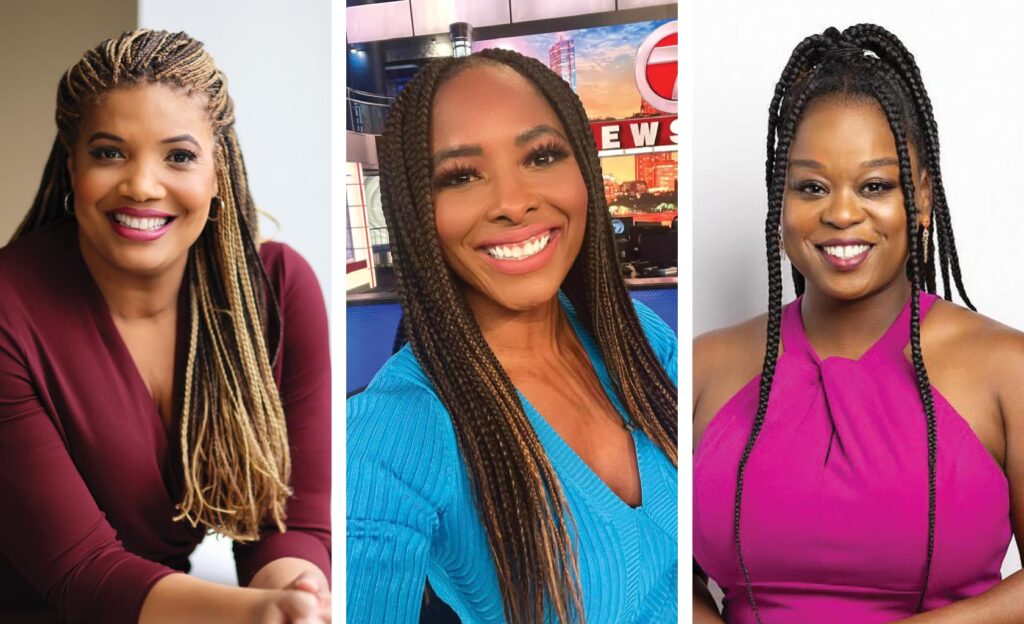Boston Black news anchors’ natural hair a show of cultural pride
Crown Act legislation plays vital role in hairstyle choice

As a child, Latoyia Edwards had her hair relaxed. Her mother was a cosmetology student and often practiced different hair treatments, techniques and styles on her daughter.
It wasn’t until years later when Edwards’ own daughter was bullied at school for wearing her natural hair that Edwards considered wearing box braids on live television.
“I remember giving her a speech saying, ‘You have to be proud of your natural hair,’” said Edwards. “Even though she never said it, I felt like she thought ‘Well, you don’t wear your hair naturally. You fry and dye and weave it.’ And I just thought, how can I be authentic to my angel, my little girl, and really show up for her?”
Edwards, a news anchor on NBC10 Boston, famously described her decision to wear braids on the air in a Boston Globe Magazine essay that drew attention to the matter.
Such is the experience for many Black news anchors — both men and women. They are told to have their hair straightened to fit Eurocentric beauty styles, and that wearing their hair naturally or in braids is “unprofessional.”
But Edwards and other anchors are leading a quiet hair revolution on air. In Boston and beyond, famous on-air personalities are going natural, in a display of cultural pride. It also helped that Massachusetts passed the Crown Act last year that bans hair discrimination in the workplace. Today, more than ever, Black anchors are showing up naturally, finally able to represent their authentic selves.
“Can you feel the joy?” wrote Amaka Ubaka, a 7News Boston anchor, in an Instagram post recently as she revealed her long braids this summer.
Ubaka grew up embracing her Nigerian ethnicity and often had her hair in braids. In college, she even wore an afro to allow her hair to breathe. But things changed when she entered the world of broadcast journalism.
She said stations would hire consultants to observe news anchors and give feedback about their appearance, speech pattern and stories. However, none of them were Black.
“It was like straight hair is the accepted look, not curly, and definitely not textured like the 4C hair I have,” she said. “I was wearing wigs and weaves and anything I could do to try to just fit into the mold of what I was supposed to do.”
Ubaka said she wanted to simplify her hair routine, especially since she was working out. She also wasn’t educated enough about the health of her hair and wearing protective styles. Watching Edwards on air with braids and reading her essay finally pushed Ubaka to make the change, she said.
“It doesn’t take away from your professionalism. It’s just you being authentically who you are and making your job way easier to manage because you’re not trying to fit into a square hole,” she said.
Kwani Lunis, a social media producer and host of the digital series “10 Questions with NBC10 Boston,” got into the industry in 2016 and said there was this mentality to “keep it neat” when it came to her hair.
“My dad loved my natural hair,” said Lunis, who first relaxed her hair at age 16. “My mom was always encouraging [about] me having my hair out, but she even understood the struggle of being a young black girl and wanting to fit in. My parents always affirmed me and my beauty in that sense.”
Lunis said she remembers the summer of 2019, when she decided to wear her hair in braids. She was tired of having to think about how to style her hair every morning, and braids were the solution. At the time, Lunis’ position was not on-air and she worried that wearing a protective style would affect her opportunity to be in front of the camera.
“I was more empowered, just because I was already fed up and tired of having to think about my hair as a factor of whether or not I could be successful in this industry,” she said.
Hair straighteners are damaging. In fact, the NAACP passed a resolution at its national conference in Boston recently to raise awareness about the dangerous link between chemicals used in hair straighteners and uterine cancer. But the anchors, recalling their own personal stories, are also hoping their industry will turn a permanent corner on the matter.
Although no one told Edwards directly that her hair needed to be straightened for television, she said it was always implied. She said she remembers a college professor telling another student from Jamaica to “wear a wig if you want to be on the news on American TV.”
Both Edwards and Ubaka said they received tremendous support from their stations and were not prepared for the overwhelming gratitude they received from the public.
“If you look at all the stations in the market, all the Black women on [NBC 10] have natural hair. Most of us are wearing braids,” Edwards said. “I’ve spoken to women at other places, and they have nerves about it. Not here.”
Ubaka said, “I heard from nurses. I heard from doctors. I received posts saying, ‘Thank you for making it easier for me to explain to my bosses why I want to do this.’ And that really struck me, because I didn’t realize the enormity of that situation.”
Since wearing braids on the air, Edwards said her daughter started wearing her hair in braids as well and no longer has any desire to straighten it.
“She wears her hair naturally, and she’s proud too. She wears it curly, kinky and she doesn’t want it straight anymore,’’ Edwards said. “There’s a new sense of pride about herself with her hair being natural or braided.”






